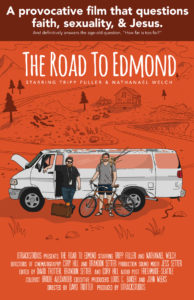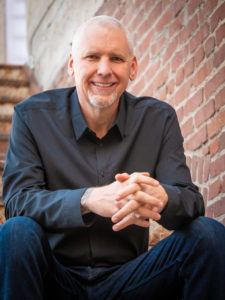It isn’t the swearing that will earn an “R” rating for a 2018 Christian film featuring a Baptist minister co-star.

Tripp Fuller
“There’s only one F-bomb,” said Tripp Fuller, speaker, podcaster and the one of the two lead actors in The Road to Edmond.
However, it’s the scene in which Fuller and co-star Nathanael Welch smoke marijuana while camping that will bar this faith-based film from the “PG” universe.
By depicting drug use, Fuller explained, “it’s automatically ‘R.’”
Lampooning purity culture
The truth is Fuller and director David Trotter weren’t focused on the rating when they made the film in 2017.
Instead, they focused on challenging rigid evangelical attitudes on issues such as teen sexuality, coming out and the open acceptance of LGBTQ people, both men told Baptist News Global.
They knew they would be ruffling feathers.

The film – which has yet to be widely released but is temporarily available online in a pay-what-you-want format – also takes on official statements of faith and a church culture that prevents Christians, and especially young people, from asking challenging theological questions.
Ministers who take a middle-of-the-road approach to LGBTQ issues, often in fear for their jobs, aren’t overlooked, either.
“It’s kind of a jab at all the moderates or silent progressives who basically go along to get a long,” Fuller said.
In some scenes entire movements are lampooned in the film.
The early 2000s Prayer of Jabez craze gets a jab along the way in The Road to Edmond.
“The butt of a lot of the jokes is purity culture,” Fuller adds.
‘More than believing the right things’
The two-hour movie sets its challenging tone right from the start. In the opening scene, youth minister Cleo, played by Welch, receives a text message from church elders directing him to take two weeks off to ponder his actions.
His offense had been to tell a teenage girl in the church, when she came out to him, that God loves her. Initially, Cleo believes the church is right.
He then meets Fuller’s character, Larry, and the pair begin a Road to Emmaus-style road trip (Welch’s character, Cleo, is named to reflect Cleopas in the biblical narrative).
Along the way, Larry challenges Cleo’s adherence to doctrines that don’t square with this compassionate behavior toward the girl.

Nathanael Welch, left, and Tripp Fuller star in The Road to Edmond.
While sitting around a campfire, Cleo begins to question his own previously unchallenged beliefs.
“You know how I said, yesterday, that I thought that the church did do the right thing by giving me two weeks to think about my commitment to faith statements and blab bla bla?” Cleo asks Larry. “I don’t know. Maybe they’re wrong.”
Perhaps he actually had done the right thing by reassuring the youth that God loves her, Cleo says.
“I don’t know. It’s got to be more than just believing the right things.”
Larry, a former youth pastor healing from emotional and spiritual wounds following a loved one’s death, responds that he prefers ministers, like Cleo, who wrestle with belief.
“I’ve met enough of them to know that they can just repeat the s— they were told over and over and over again and not even pay attention to the fact that their unexamined questions actually lead to people hurting themselves, hating themselves, denying themselves and wondering whether or not they really matter.”
Provoking conversation
Cleo’s dilemma is one Trotter said he strongly identifies with.
A former non-denominational church pastor and church planter, Trotter recalled getting emails from LGBTQ people asking if they could come to his church.

David Trotter
“I would say, ‘of course.’”
But when asked if they could participate fully in the life of the church, including in ministry, Trotter said he responded with church policy.
“The emails would quickly end,” he said.
Trotter said he felt unsafe to broach the topic of same-sex relationships with other ministers or members because “you’re putting relationships and your job on the line.”
The Road to Edmond is meant to spark conversations on these and other topics and to let pastors know they aren’t alone in struggling with their churches’ stance on these issues.
It’s why Fuller is joining Christian thought leader Brian McLaren for a livestream discussion of the film Jan. 31 at 1 p.m. Eastern on Facebook.
Trotter and Fuller, who wrote the story together, want to see the film discussed – and debated – in a variety of formats.
“I hope this provokes the conversation about how we are treating people and what Jesus would say about this situation,” Trotter said.
‘The preachiest moment’
The dialogue mostly is delivered within humorous situations.
“It’s not preachy,” Fuller said. “The preachiest moment is the sermon in the gay wedding.”
In that scene, Fuller’s character conducts the church wedding for a lesbian couple. He paraphrases Christ’s words to them, saying “greater love has no man – or woman – than they that lay their life down for their friends.”
Mixing the serious and the humorous has become something of a vocation for Fuller, a graduate of Campbell University, Wake Forest Divinity School and the Claremont School of Theology.
His Homebrewed Christianity podcast boasts 70,000 listeners a month, more than 3 million downloads and has featured leading Christian thinkers such as N.T. Wright, Brian McLaren, John Dominic Crossan and Richard Rohr, among others.
Humor, curiosity and compassion are glaringly absent in many church settings, he said.
“A lot of times people take their conclusions more serious than they take the process of being faithful,” Fuller said.
Part of the solution is for people to lighten up, he said.
“It’s not so smart to trust a religious person who doesn’t have a sense of humor.”
